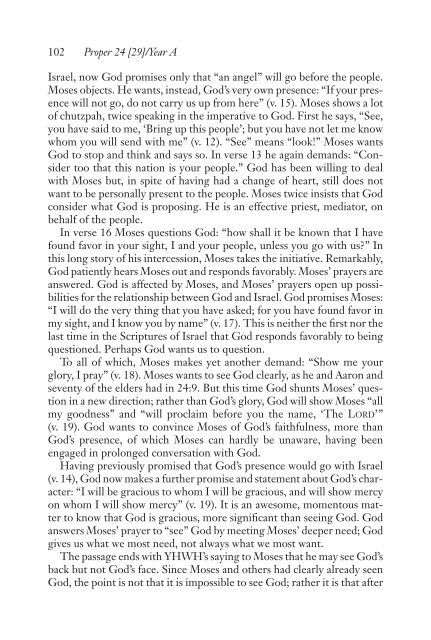000 Allen FMT (i-xxii) - The Presbyterian Leader
000 Allen FMT (i-xxii) - The Presbyterian Leader
000 Allen FMT (i-xxii) - The Presbyterian Leader
You also want an ePaper? Increase the reach of your titles
YUMPU automatically turns print PDFs into web optimized ePapers that Google loves.
102 Proper 24 [29]/Year A<br />
Israel, now God promises only that “an angel” will go before the people.<br />
Moses objects. He wants, instead, God’s very own presence: “If your presence<br />
will not go, do not carry us up from here” (v. 15). Moses shows a lot<br />
of chutzpah, twice speaking in the imperative to God. First he says, “See,<br />
you have said to me, ‘Bring up this people’; but you have not let me know<br />
whom you will send with me” (v. 12). “See” means “look!” Moses wants<br />
God to stop and think and says so. In verse 13 he again demands: “Consider<br />
too that this nation is your people.” God has been willing to deal<br />
with Moses but, in spite of having had a change of heart, still does not<br />
want to be personally present to the people. Moses twice insists that God<br />
consider what God is proposing. He is an effective priest, mediator, on<br />
behalf of the people.<br />
In verse 16 Moses questions God: “how shall it be known that I have<br />
found favor in your sight, I and your people, unless you go with us?” In<br />
this long story of his intercession, Moses takes the initiative. Remarkably,<br />
God patiently hears Moses out and responds favorably. Moses’ prayers are<br />
answered. God is affected by Moses, and Moses’ prayers open up possibilities<br />
for the relationship between God and Israel. God promises Moses:<br />
“I will do the very thing that you have asked; for you have found favor in<br />
my sight, and I know you by name” (v. 17). This is neither the first nor the<br />
last time in the Scriptures of Israel that God responds favorably to being<br />
questioned. Perhaps God wants us to question.<br />
To all of which, Moses makes yet another demand: “Show me your<br />
glory, I pray” (v. 18). Moses wants to see God clearly, as he and Aaron and<br />
seventy of the elders had in 24:9. But this time God shunts Moses’ question<br />
in a new direction; rather than God’s glory, God will show Moses “all<br />
my goodness” and “will proclaim before you the name, ‘<strong>The</strong> LORD’”<br />
(v. 19). God wants to convince Moses of God’s faithfulness, more than<br />
God’s presence, of which Moses can hardly be unaware, having been<br />
engaged in prolonged conversation with God.<br />
Having previously promised that God’s presence would go with Israel<br />
(v. 14), God now makes a further promise and statement about God’s character:<br />
“I will be gracious to whom I will be gracious, and will show mercy<br />
on whom I will show mercy” (v. 19). It is an awesome, momentous matter<br />
to know that God is gracious, more significant than seeing God. God<br />
answers Moses’ prayer to “see” God by meeting Moses’ deeper need; God<br />
gives us what we most need, not always what we most want.<br />
<strong>The</strong> passage ends with YHWH’s saying to Moses that he may see God’s<br />
back but not God’s face. Since Moses and others had clearly already seen<br />
God, the point is not that it is impossible to see God; rather it is that after




